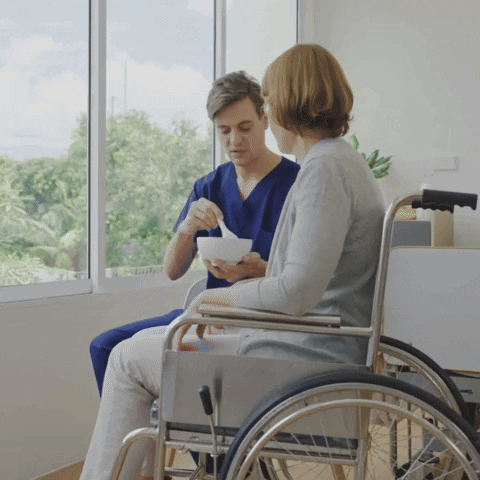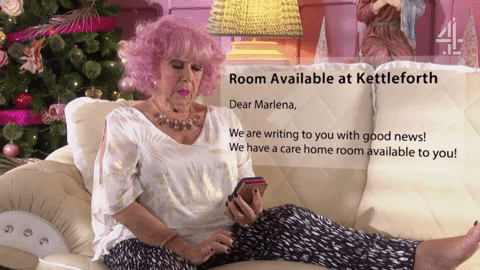How to Talk to Your Parent About Assisted Living
I love you, and I want to make sure you’re safe and well taken care of.
The population of people over 80 in the United States is projected to increase by almost 50% over the next ten years, rising from 13.9 million to 20.8 million.
That’s a lot of difficult conversations. Use the following guide to navigate these conversations with your parent and siblings.
Start Here
Prepare for the conversation
Do your research: Be prepared to discuss the benefits of assisted living, including safety, socialization, and access to medical care. Knowing specifics about the facility you have in mind can help answer concerns.
Anticipate resistance: Understand that your parent may feel scared, angry, or upset. Be ready for an emotional reaction and remain calm.
Start with empathy and acknowledge their feelings: Begin the conversation by validating your parent's emotions. Let them know you understand how difficult this topic might be and that you respect their independence and feelings.
Use "I" statements: Instead of saying “You need to...,” try phrases like “I worry about your safety living alone.”
Express your concerns out of love: Make it clear that your concerns come from a place of love and wanting the best for them. Share specific examples of why you think extra support might be helpful, such as safety concerns or daily challenges.
Focus on safety and health: Emphasize the benefits of assisted living in terms of health and safety, such as reducing fall risks, providing help with medications, and ensuring they have access to care when they need it.
Present it as a positive change: Frame the transition as an opportunity for positive improvements, such as access to social activities, less stress over home maintenance, and more time for hobbies and enjoyment.
Take a gradual approach: Suggest initial visits to different communities without immediate pressure to decide.
Acknowledge their autonomy: Reassure your parent that this decision is theirs to make. Show that you respect their ability to decide what’s best for them, and emphasize that they will still have control over their life.
Use a collaborative approach: Position the conversation as a partnership. Discuss how you can work together to find the best solution that meets their needs while respecting their wishes.
Offer reassurance and ongoing support: Let them know that moving to assisted living doesn’t mean losing family support. Assure them that you’ll still visit, stay connected, and be there for them as always.
Set a trial period (if possible): Suggest trying assisted living for a short time to see how they feel about it. A trial period can reduce anxiety and allow them to experience the benefits without the pressure of making a permanent decision.
Remain patient: Understand that this conversation may take time. Be patient and give your parent the space to process the information and express their concerns.
Timing matters: Pick a moment when your parent is in a good mood and the environment is calm.
Involve a trusted third party: Sometimes a doctor or another family member can help support your position and provide a neutral perspective.
Prepare for follow-up discussions: This is likely not a one-time conversation. Be ready for ongoing dialogue.
Common Misconceptions About Assisted Living to Address:
Loss of Independence: Many seniors fear that moving to assisted living means giving up their autonomy. In reality, assisted living is designed to promote independence by providing support only where needed, allowing residents to manage their daily lives as much as possible.
It's the Same as a Nursing Home: Assisted living communities are very different from nursing homes. They focus on supporting independence and quality of life, rather than providing intensive medical care.
It's Too Expensive: While costs can seem high initially, assisted living often includes many services and amenities that would be separate expenses at home. When comparing total costs, it can be comparable to or even less expensive than receiving similar services at home.
Residents Are Isolated or Bored: Modern assisted living communities offer numerous social activities, events, and opportunities for engagement. Many residents report having busier and more fulfilling social lives than before.
The Food Is Bad: Many communities now offer chef-prepared meals with a variety of options to cater to different tastes and dietary needs.
It's Only for Those Needing Significant Medical Care: Assisted living is suitable for seniors with varying levels of need, from those who are largely independent to those requiring more assistance.
Staff Are Uncaring or Unqualified: Most facilities have strict hiring standards and provide extensive training to ensure staff are qualified and compassionate .
Residents Lose Their Privacy: Assisted living communities typically offer private apartments or rooms that residents can personalize, and staff respect residents' privacy.
There’s a Rigid Schedule to Follow: While there are organized activities, residents have the freedom to choose how to spend their time and which activities to participate in.
Talking Points to Use with Your Parent
I know this is a difficult topic, and you’ve always been independent. I understand this feels overwhelming.
I know this is a tough conversation to have, and I completely understand how hard this must feel for you. You’ve always been so independent, and that’s something I admire about you.
It must be hard to think about leaving your home, and I don’t take that lightly.
I love you, and I want to make sure you’re safe and well taken care of.
It’s normal to feel apprehensive about change, and I want you to know that I’m here to listen to any concerns or fears you may have.
I love you, and I’m bringing this up because I want the best for you.
I’ve noticed that it’s been harder for you to manage things like [specific examples, e.g., cooking, getting up the stairs]. I’m worried that something might happen, and I wouldn’t be there to help.
Assisted living will give you access to care whenever you need it, and that gives me peace of mind.
I want to make sure you have the support you need, especially if there’s an emergency.
This decision is ultimately yours. I want you to feel comfortable, but I also want to help you make the best decision for your health and happiness.
Let’s visit a few places together so you can see what options are out there.
I’ll visit you as often as possible, and you’ll still be a huge part of my life.
This isn’t goodbye to your independence, it’s just making sure you have the support you need.
What if we try it for a couple of months and see how you feel? If it doesn’t work, we can look at other options.
I’ve been thinking a lot about your safety, and it’s clear that being in a place where help is available right away could make a huge difference in giving both of us peace of mind.
Assisted living could offer you support with things that might be getting a little harder, like managing medications or making sure someone is around in case of an emergency.
This doesn’t have to be a loss of independence—it could be a way to free you from the things that have become more of a burden, like cooking or cleaning, so you can focus on things you enjoy.
There’s a chance to be around people, have more social activities, and engage in the things that make you happy without worrying about day-to-day chores.
At the end of the day, this is your decision, and I’m here to support you in whatever way I can. I just want to explore what options are out there so we’re prepared when the time comes.
I want you to be in control of how this transition happens. Your voice matters more than anything in this decision.
We’re in this together. I’d love to visit some places with you, get a sense of what they’re like, and see what might feel like a good fit for you.
I’m not pushing for any decisions right now, but it would be great to look at what’s available and find a place that fits your needs and preferences.
You won’t be going through this alone. I’ll be there every step of the way—helping with the move, visiting often, and staying as involved as you want me to be.
This doesn’t mean we won’t see each other as much. We’ll still spend time together, and I’ll always be just a phone call away.
Let’s have this conversation when we both have time to think it through. I want to make sure we aren’t distracted by anything else right now.
We don’t need to make any decisions today. I’m happy to keep talking about this as many times as you need, and we’ll figure things out as we go.
This isn’t a one-time conversation, and I know it’s a big decision. Let’s keep talking about it when you’re ready, and we’ll find the best path forward together.
When the Parent Doesn’t Have a Choice Due to Health and Safety Concerns
Your health and safety are our top priority, and right now, the doctors are telling us that staying at home is no longer safe. I understand how hard this is, but we have to listen to what’s best for your well-being.
I know this isn’t the easiest choice, but it's not about losing independence. It’s about gaining the peace of mind that comes from knowing you're in a place where professionals are available to help if you need them, especially in emergencies.
We all love you so much, and it’s hard for us to see you struggle. By moving to a place where you have immediate support, it not only ensures your safety but also helps us all feel confident that you’re well taken care of.
The decision isn’t just about today—it’s about ensuring you’re in a place where you can thrive in the long term. Assisted living can provide the care you need now, but it also adjusts as your needs change over time.
We’ve always admired your strength and resilience, and this decision is another way to stay strong. It’s about making sure you can continue enjoying life with the right support rather than taking unnecessary risks that could lead to something much more serious.
I know you want to stay at home, but staying there could lead to a crisis that none of us want. Being proactive now can prevent something worse down the road.
This decision impacts all of us, and while we don’t see you as a burden, the worry and stress we all feel every day are real. Knowing you’re somewhere safe gives all of us—especially you—relief from that constant fear.
The truth is, when you’re in a safe and supportive place, it also allows us to focus on spending quality time together without the constant concern of ‘what if something happens?’ That’s what’s most important to all of us.
The care you need isn’t something that can be easily handled at home anymore. By choosing assisted living, you’re choosing a team of professionals who know how to provide the best care while allowing you to continue living life as fully as possible.
This isn’t a permanent “loss” of independence—it’s a shift in how you live day-to-day, with the right support to help you stay as independent as possible for longer.
We can’t avoid the fact that your safety is at risk if you stay at home, and that’s too big a gamble for all of us to take. Moving to assisted living means we can all rest easier, knowing you’re in good hands.
The doctors have made it clear that this is about your health and safety. I wish we could approach this differently, but it’s no longer safe for you to stay at home.
I know how difficult this is, and I want you to understand that this decision is being made out of love and concern for your well-being. We all want you to be in a place where you’ll get the help you need.
It’s not just about your safety; it’s about making sure we all have peace of mind. We love you and worry about you every day, and being in a place where care is readily available would ease that worry for all of us.
I know this isn’t the path you would have chosen, but when your health is at risk, we have to make sure you’re in an environment where you’ll be cared for 24/7.
Your health affects everyone in the family, and when you’re not safe, it creates a lot of worry and stress for us. We want you to feel supported and taken care of so we can all focus on enjoying our time together rather than constantly worrying about “what if” scenarios.
If they say, “I’m such a burden:” Please understand that this isn’t about you being a burden; it’s about making sure the whole family feels reassured knowing that you’re in a safe, supportive place where help is always nearby.
Moving to assisted living isn’t about giving up independence. It’s about making sure you have the right care, and that allows us, as a family, to feel secure that you're in the best possible hands.
What to Say to a Sibling Who Disagrees with the Doctors
The doctors have been very clear about what’s best for Mom/Dad right now. I know this is hard, but their health and safety can’t be compromised, and we have to trust the medical advice we’re being given.
I understand that you want to respect their independence, but we’re at a point where staying at home is no longer a safe option. We have to think about what will keep them safe and healthy in the long run, even if it’s not what they would have chosen.
I know you’re coming from a place of love, but if we ignore the advice of professionals, we could be putting Mom/Dad at serious risk. What if something happens that could have been prevented by moving them to assisted living?
This isn’t about taking control away from them—it’s about making sure they have the best care available. Assisted living will allow them to still be independent, but with the support they need in case of an emergency.
I know you’re struggling with this decision, but we have to face the reality of the situation. The risks of staying at home are too great, and we don’t want to wait until something bad happens to make a decision.
We’ve always done what’s best for Mom/Dad together, and now we need to do that again. Ignoring the doctor’s orders could have serious consequences that we can’t afford to overlook.
This decision isn’t just about what Mom/Dad wants in the moment; it’s about ensuring their long-term safety and quality of life. Assisted living can provide them with the support they need as their health changes, something we can’t offer at home.
I know it’s a tough call, but keeping them at home could create more stress and challenges for all of us, especially if their condition worsens. Moving them to a place with professional care can help take that burden off us while keeping them safe.
I love Mom/Dad as much as you do, and this isn’t an easy decision for any of us. But if we delay this decision and something happens, we’ll regret not taking action when we had the chance.
I don’t want us to be in a situation where an accident forces a decision under crisis conditions. Let’s take control of this situation now, while we can make a thoughtful, informed decision.
I know this is emotional, but we can’t let our feelings get in the way of what’s best for them. Assisted living ensures that they get the help they need, and we’ll still be very involved in their care and lives.
We need to focus on what’s safest for them, not just what feels easiest for us emotionally. This is about making sure they’re cared for in the best way possible, which means listening to the professionals.
The last thing I want is for either of us to feel regret later because we didn’t act when we had the opportunity to keep them safe. We’re doing this because we love them, even if it’s hard right now.
Further Reading
How to Talk to Your Parent About Assisted Living – A Place for Mom
11 Key Signs It Might Be Time for Assisted Living – Senior Lifestyle
How to Talk to Your Loved One About Assisted Living – Desert Springs Healthcare
The Ultimate Guide for How to Talk to Your Parents About Assisted Living – Sage Aging ElderCare Guide
How to Have the Assisted Living Talk – Senior Living Residences
How to Overcome Resistance When Your Parent Needs Assisted Living – The Kensington Falls Church
Addressing Common Misconceptions About Assisted Living – Discovery Villages
Talking to a Loved One About Assisted Living – Vista Springs Living
How to Know When It’s Time for Assisted Living – A Place for Mom
How to Help Your Parent Move to Assisted Living – AgingCare








